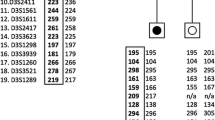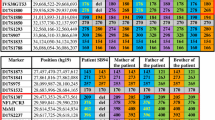Abstract.
Inactivating mutations in the TSC2 gene, consisting of 41coding exons in 40 kb on 16p13, cause the hamartoma syndrome tuberous sclerosis. During TSC2 mutational analysis we identified ten SNPs that occur within or close to exon boundaries at minor allele frequencies greater than 5%. We determined the haplotypes for six of these SNPs and the microsatellite marker kg8 in the 3′ region of TSC2 in a set of 40 parent-child trios. The most common haplotypes accounted for 53%, 11%, 6%, and 5% of chromosomes. Thirty-eight TSC2 mutation-bearing haplotypes had a similar distribution, indicating that there was no haplotype that predisposed to mutation in this region of TSC2. Family analysis was possible in 12 sporadic cases, and indicated that the mother was the parent of origin in 7 cases (3 point mutations, 2 small deletions, 2 large deletions), while the father was in 5 cases (2 point mutations, 3 small deletions). We conclude that TSC2 mutations occur at substantial frequency on both the maternally and paternally derived TSC2 alleles, in contrast to many other genetic diseases including NF1. The observations have implications for genetic counseling in TSC.
Similar content being viewed by others
Author information
Authors and Affiliations
Additional information
Electronic Publication
Rights and permissions
About this article
Cite this article
Roberts, P.S., Chung, J., Jozwiak, S. et al. SNP identification, haplotype analysis, and parental origin of mutations in TSC2 . Hum Genet 111, 96–101 (2002). https://doi.org/10.1007/s00439-002-0738-y
Received:
Accepted:
Published:
Issue Date:
DOI: https://doi.org/10.1007/s00439-002-0738-y




